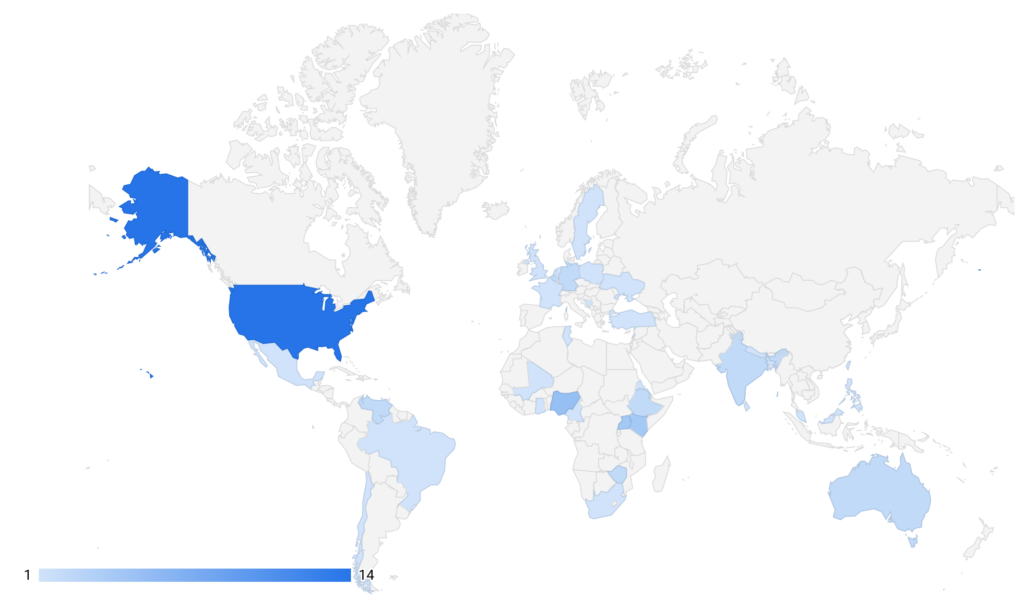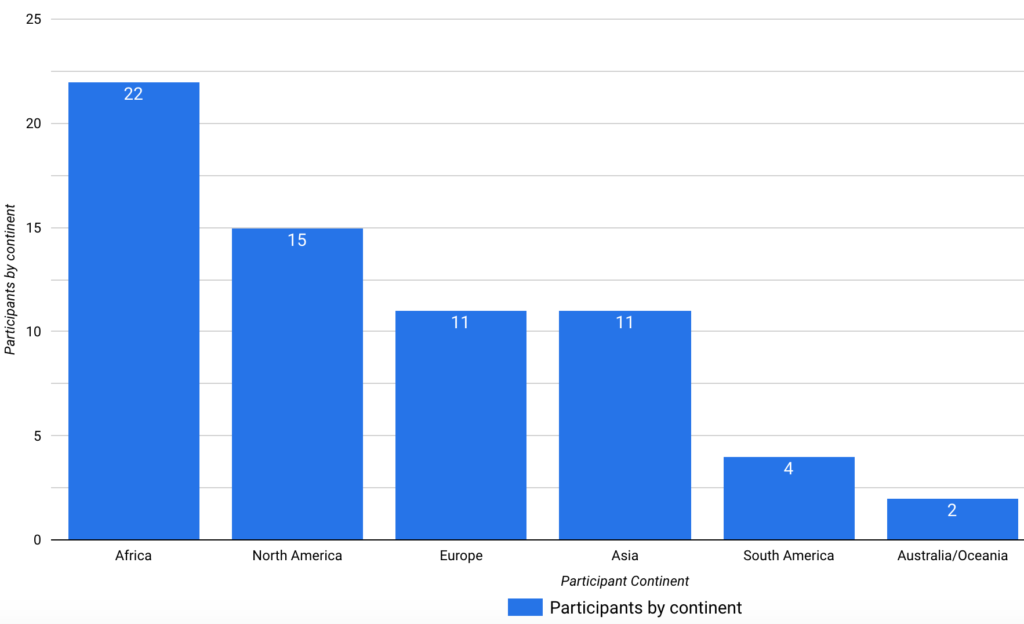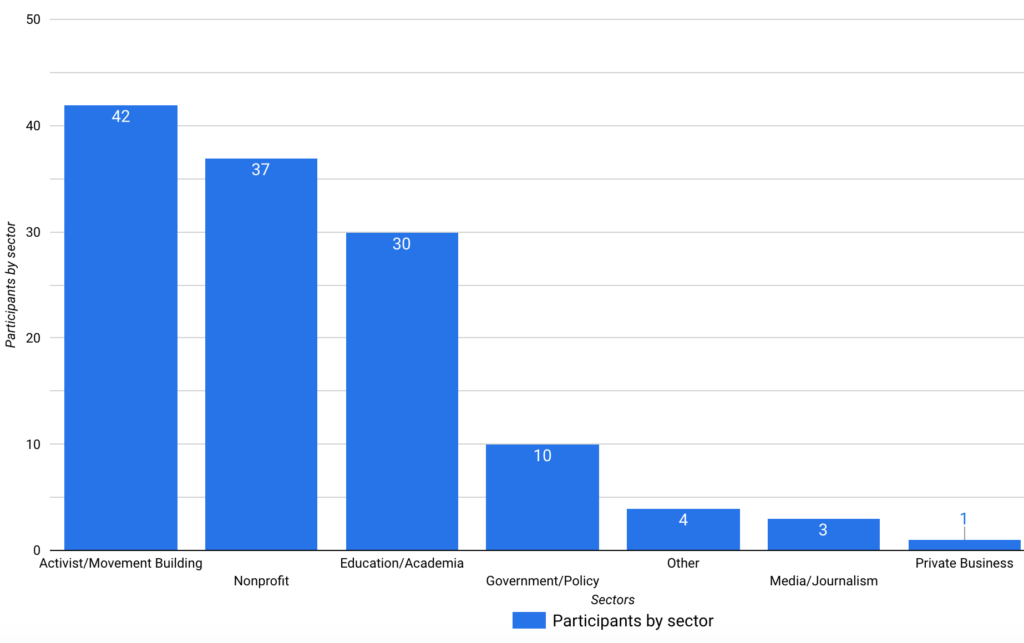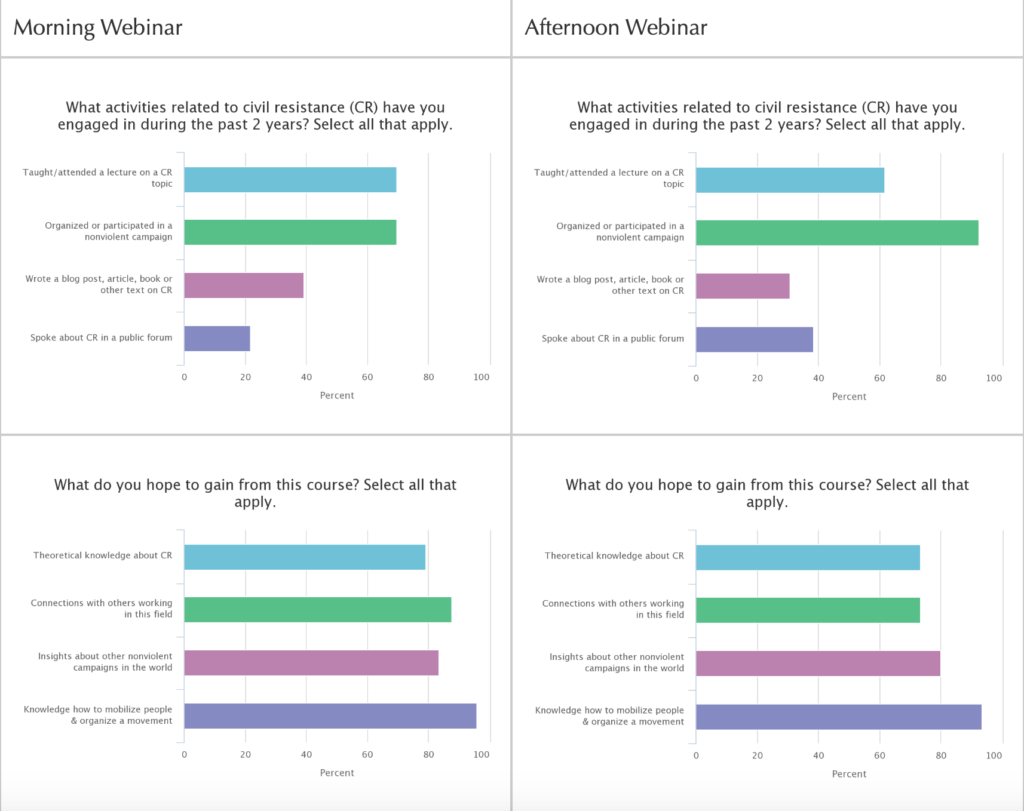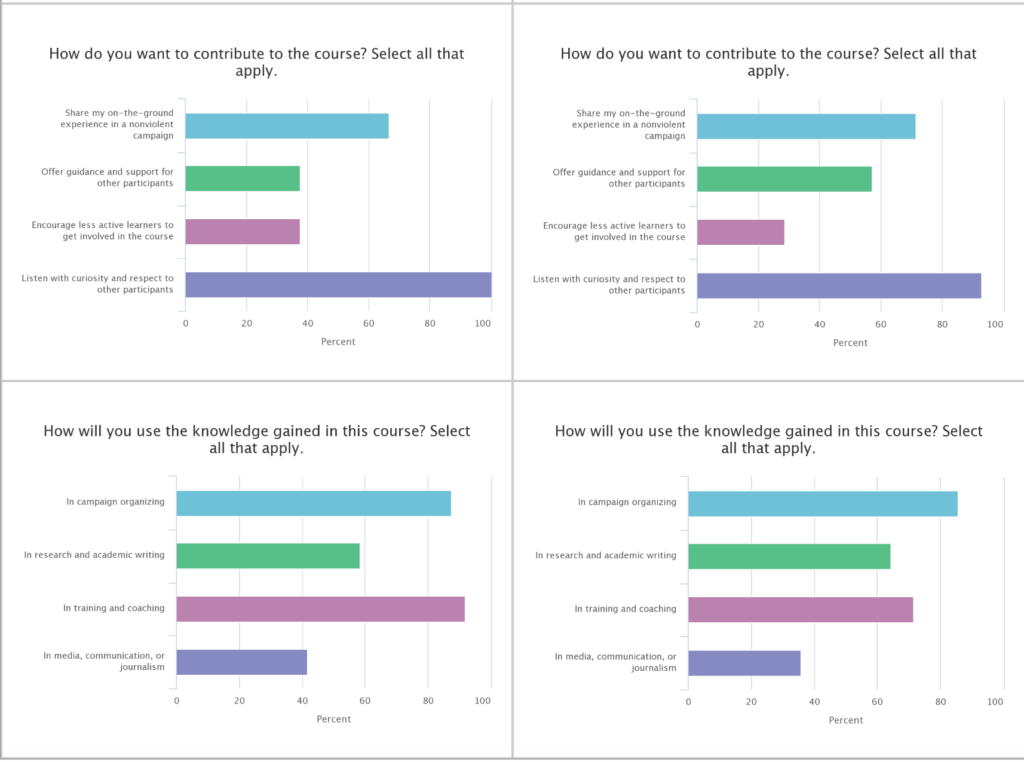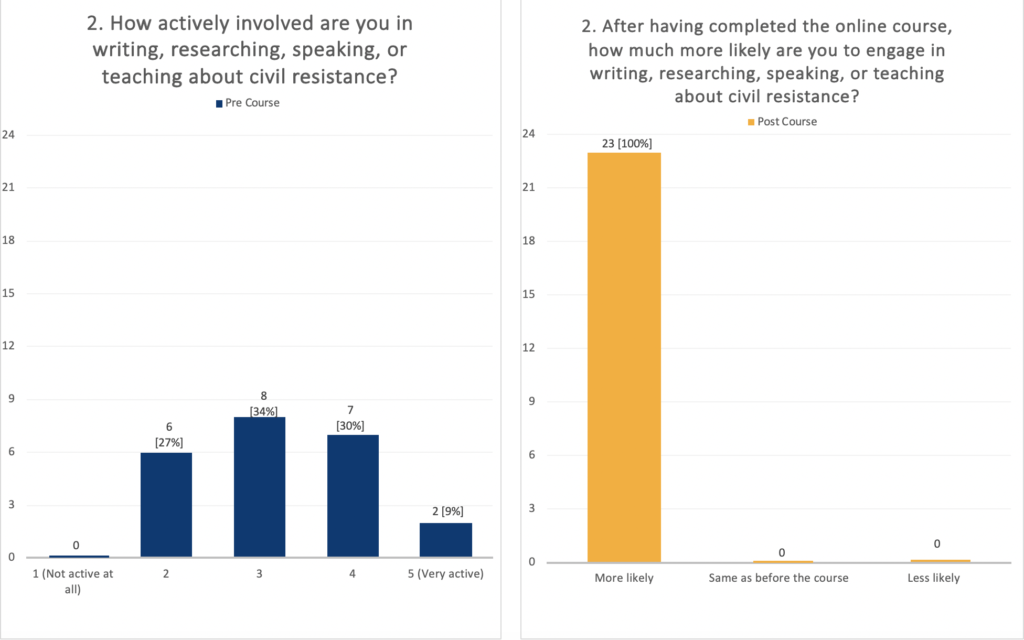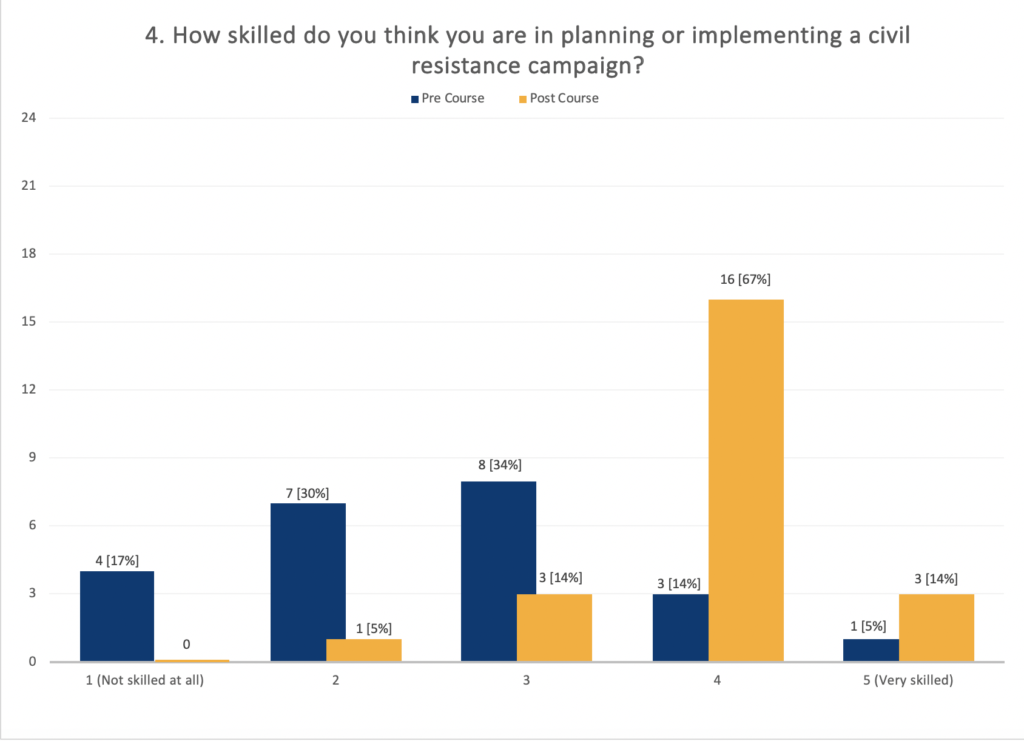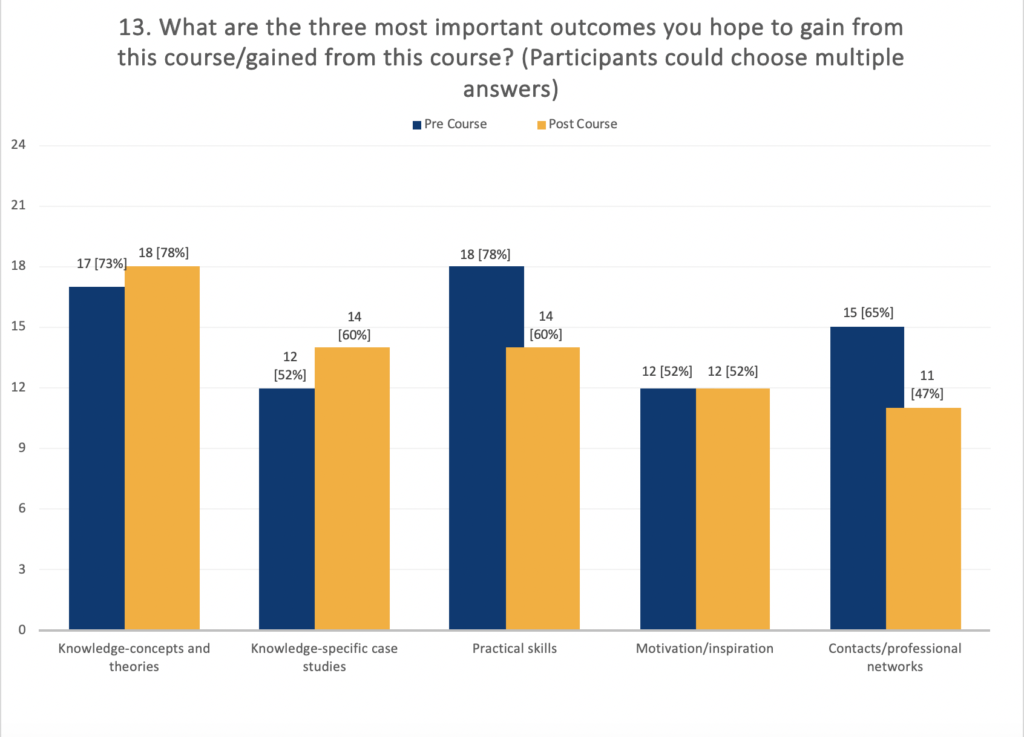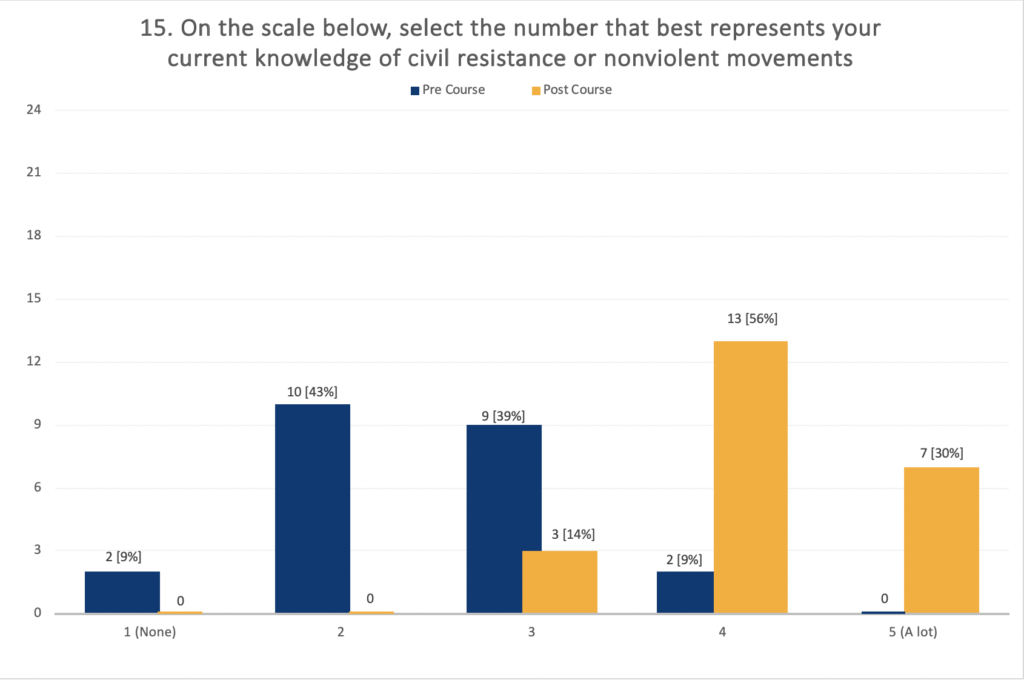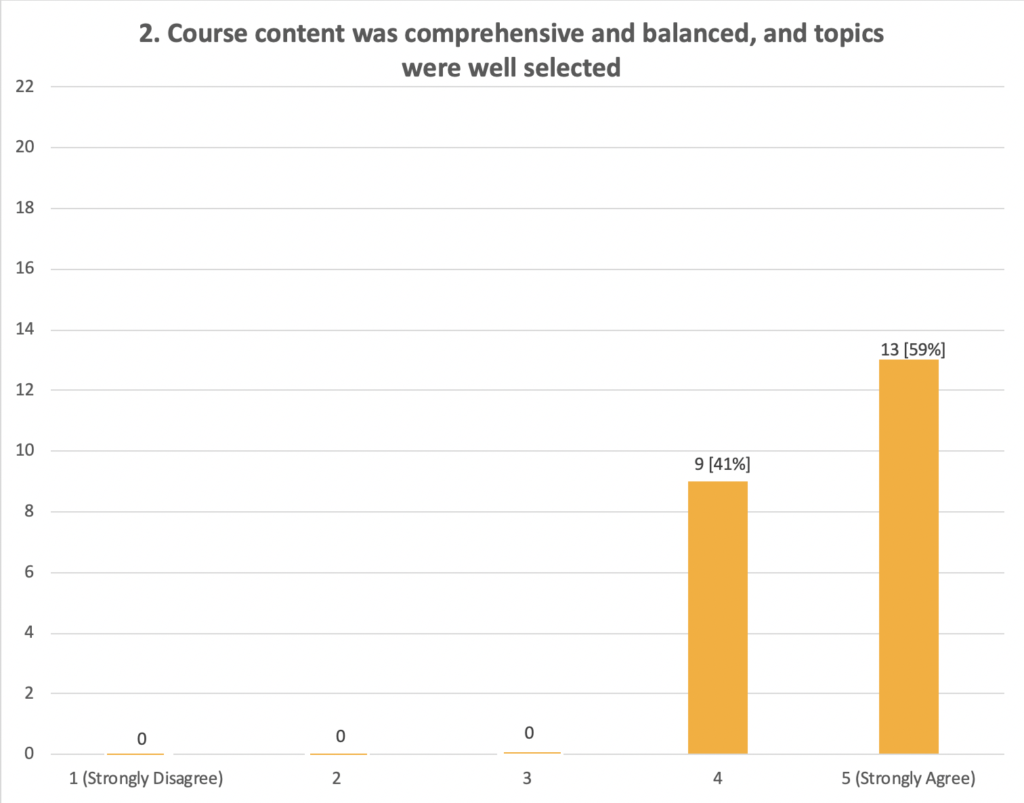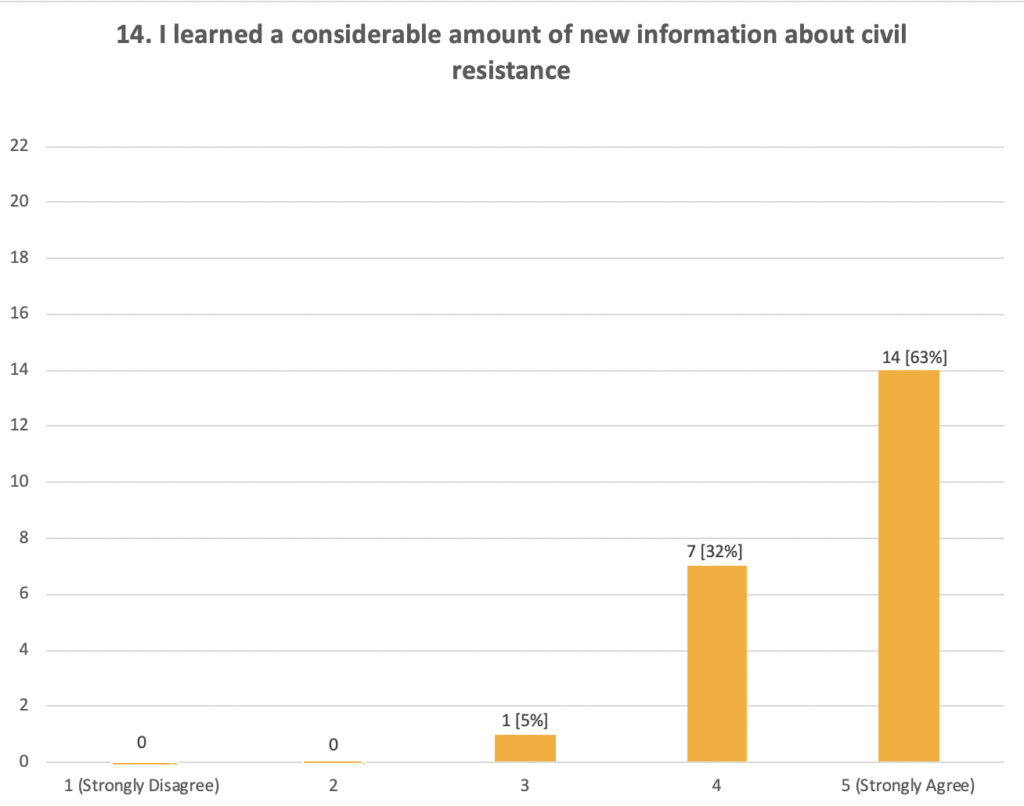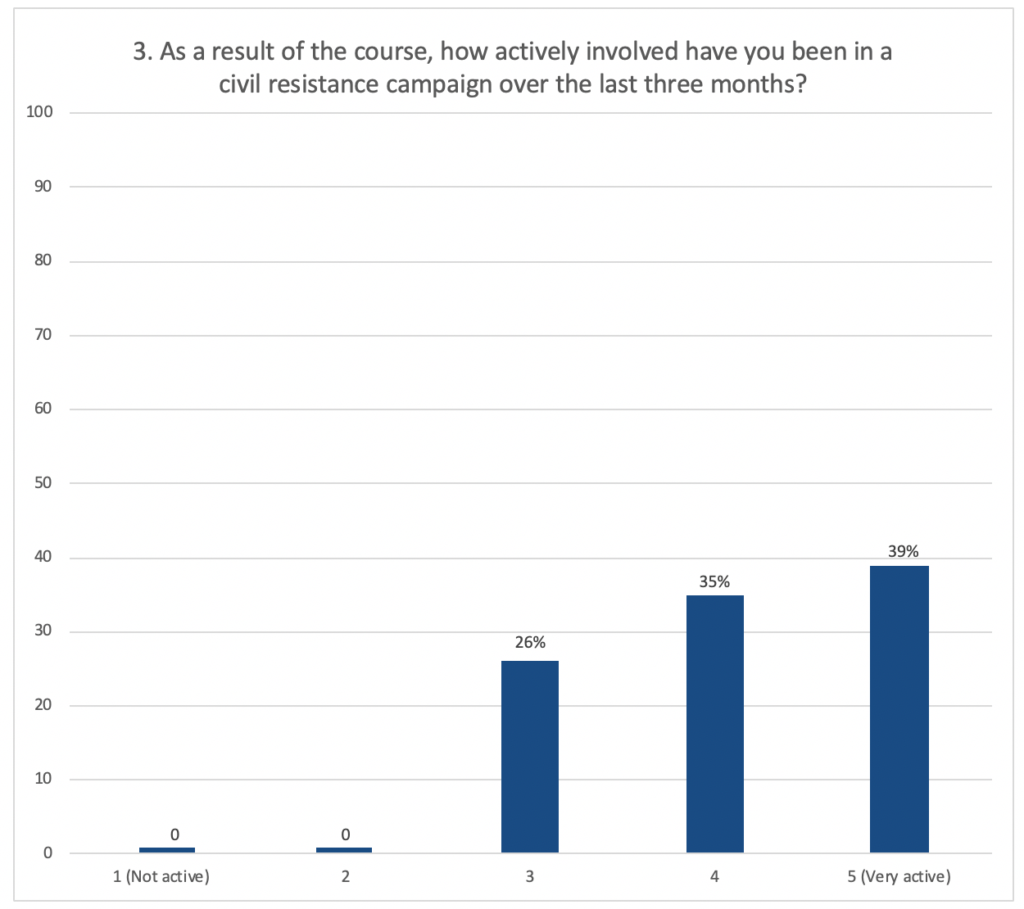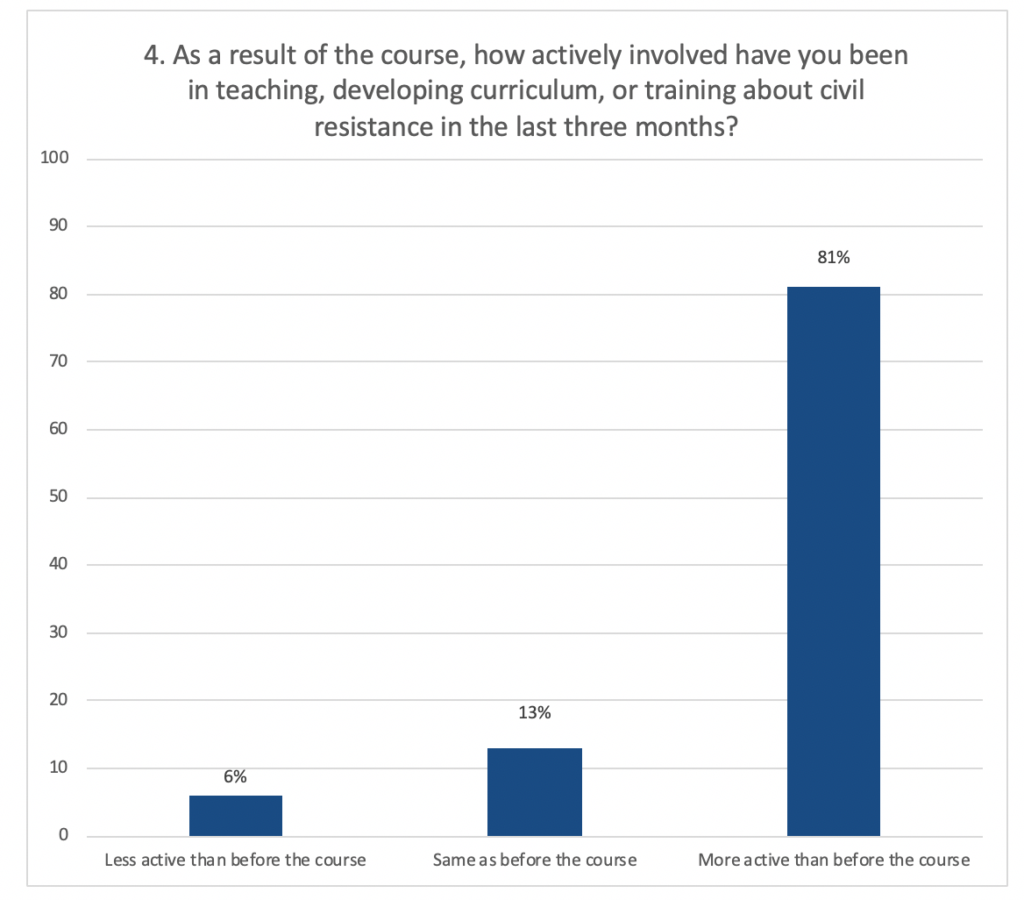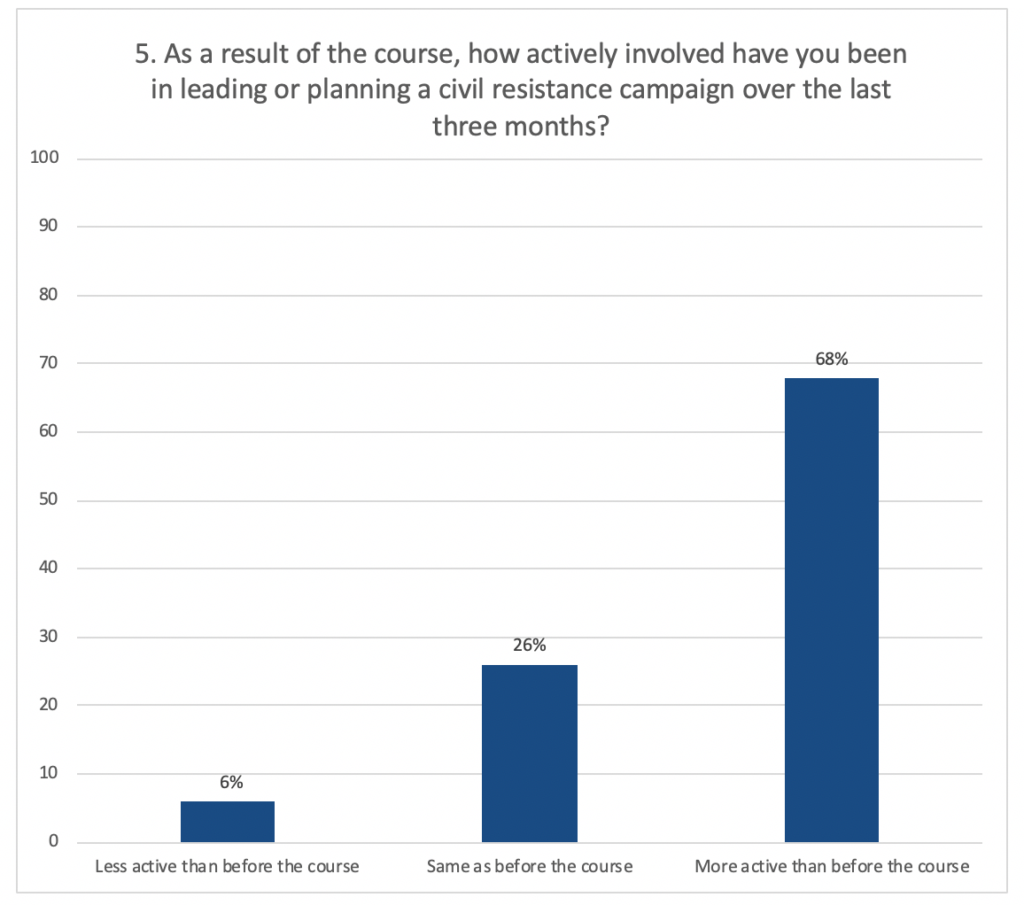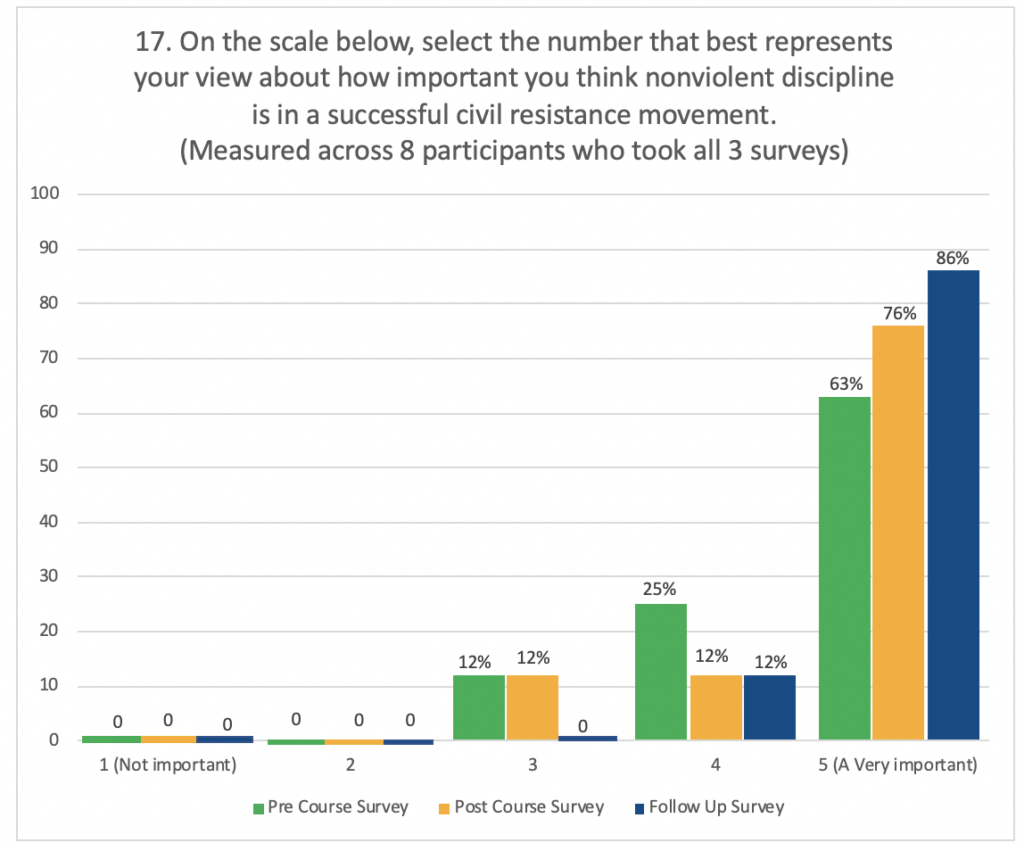2019 ICNC-Rutgers Online Course Assessment
ICNC offered a moderated online course: “People Power – The Study of Strategic Nonviolent Resistance” in partnership with the International Institute for Peace at Rutgers University Graduate School, which took place from October 2nd, 2019 to November 25th, 2019. This was the seventh year that ICNC has run this course.
Read more about the 2019 course and assessments below.
You can also view assessments from previous courses in 2018, 2017, 2016, 2015, 2014, 2013, 2012.
Applications, Admission and Course Participants
In 2019, ICNC received 124 applications for the People Power online course. The quality of applications was high and it took several rounds of reviews to select the 65 participants who were invited to take part in the online course.
The 65 accepted applicants came from a wide range of backgrounds and countries, as shown in the graphs below. The largest number of participants came from Africa with 22, followed by North America with 15. Both Europe and Asia had 11 participants each. Below is more detailed breakdown per region.
The accepted participants also came from a diverse range of professional backgrounds. The majority of participants had a background in activist/movement building, followed closely by a background in non-profits, and then by education/academia. Participants could choose more than one answer when selecting their background.
Before the course began, ICNC hosted two orientation webinars for course participants. Each orientation webinar contained survey questions asking participants what they hoped to gain from the course. In summary, participants indicated that they wanted to gain practical knowledge on how to organize civil resistance campaigns more effectively, as well as learning about general dynamics, concepts and cases of civil resistance. The participants also wanted to share their own on-the-ground experience with other learners.
Course Content
For the fourth year, ICNC had Academic Advisers who moderated the various discussion forums, adding an important value to the overall educational experience and a recognition to the course standing. The course moderators included: Dr. Kurt Schock, Dr. Veronique Dudouet, Dr. Kathleen Gallagher Cunningham, Isak Svensson, Dr. Cecile Mouly, Dr. Janjira Sombatpoonsiri, Dr. Maciej Bartkowski, Dr. Steve Chase, Bruce Pearson and Daniel Dixon.
For the first year, ICNC had former course participants moderate the course. These were alumni from previous courses who brought unique perspectives. ICNC intentionally asked former participants from Southeast Asia and South America in order to bolster the conversation on civil resistance.
For the third year, the online course featured interactive group work that participants engaged in. Participants completed this work during Modules 3 and 6. Their work consisted of answering discussion questions, holding video conferences, and developing a summary/statement regarding the content in each respective module.
Course instructors provided summaries of the forum discussions in a particular module, highlighting key points made, debates taking place and core information that was shared.
Course participants also had access to the ICNC Mobile App, available on iOS and Android. By using the app, participants could download the course content and access it offline when they were travelling or if they were in areas with low internet access.
Module 1: Welcome and Introductions
In the welcome module, we laid out the objectives of the course. We discussed course activities, including forum posts, recorded webinars, readings, videos, webinar meetings and online discussions. We then introduced the participants and course organizers and moderators. We provided online learning tips to help participants make the most of the online learning experience. Finally, we introduced participants to the People Power Game: A Strategic Game About Civil Resistance, a video simulation that participants play throughout the course, during which the player takes on the role of a strategic planner for a nonviolent movement.
Module 2: Foundation of Civil Resistance
In this session we laid the theoretical groundwork out of which this field has grown, digging into both data and the big picture. Virtually every day, somewhere in the world, there are people engaging in civil resistance. But what do we mean by this term? Do we all understand it the same way? How is civil resistance defined and spoken about in participants’ towns, communities, regions or countries? In this session we clarified the concept of civil resistance, looking into power that underlies people’s actions and considering the track record of civil resistance over the past 110 years, including the reasons behind its effectiveness. This module aimed to equip participants with data to share with others in their networks about the effectiveness of civil resistance, and to enable them to articulate what civil resistance is in a clear and concise manner.
Module 3: Cases of Civil Resistance Around the World
In this module, participants were organized into nine different small groups and tasked with several group assignments. This unit feature ICNC’s newest course features, which was an interactive timeline on the history of civil resistance,
Module 4: Strategies and Tactics of Civil Resistance
In this session, participants looked at what strategy in civil resistance is, and how it relates to tactics. We examined examples of different tactics, including cultural resistance tactics, and discuss tactical innovation, including strategic sequencing of tactics that enhance the effectiveness of nonviolent methods and campaigns. We also looked at the role of gender in civil resistance. Finally, we explored different conflict analysis tools that help movements systematically assess and analyze the battlefield in which they are engaging nonviolently.
Module 5: Repression and Backfire, Defections, Violent Flank
In this session, we started with a discussion about repressive contexts in which nonviolent resistance movements take place, and the phenomenon of backfire when violence against unarmed activists boomerangs back to those who carried out the repression. We explored how civil resistance movements can optimize the impact of backfire and use it to their advantage. How does the side that uses repression aim to hinder potential backfire? We then discussed defections that often, though not always, occur as a result of the backfire effect. This module focused on understanding defections from one group — security forces — and explores conditions under which the defections might happen. It also explored how regimes often try to mitigate the likelihood of security defections, and strategies that movements might deploy to increase chances of loyalty shifts among security forces. The last topic that this module explored was that of violent flanks. We looked at how the presence of a violent group — either part of a larger nonviolent movement or existing separately from it (e.g. armed insurgency) — impacts the dynamics and effectiveness of nonviolent struggle overall.
Module 6: Anti-Corruption Campaigns and Civil Resistance
This module was the second group work module. Participants were given a hypothetical case study and their group assignment was to create an anti-corruption campaign strategy plan. After watching videos and reviewing readings, the groups held online discussions and video conferences to discuss their groups’ campaign plan. They finished the module by creating a campaign strategy plan and sharing their work with the other groups for their review.
Module 7: New Frontiers in Civil Resistance
This module explored a variety of topics in the study of civil resistance, including: cultural resistance, faith communities and civil resistance, democratization and civil resistance, and civil resistance and corporate governance. These (and other) topics were considered new frontiers in the quickly evolving field of civil resistance studies. They are often seen as either under-researched or only now gaining significance in the analysis of nonviolent conflict.
Module 8. Final Course Evaluation & Learning Gains Survey
In the last two days of this online course we solicited participants’ views about the course and their learning experience. We asked about their learning progress, overall educational experience, assessment of the course content, interactions in the forums, and their personal engagement during the six-week period. This feedback has allowed us to improve our future online courses and make our teaching pedagogy on civil resistance more effective and more impactful on all learners involved.
Learning Gains Survey Results
Included below are the graphed responses to selected questions from the learning gains survey (conducted among the same group of participants that took both surveys) that demonstrate the extent of the knowledge gains from before and after the course.
The Pre-Course Learning Gains survey was completed by 42 participants and Post-Course Learning Gains survey by 25 participants. The comparative results from Pre and Post-Course surveys, included in the graphs below, are based on the responses of 23 participants that filled out both surveys. To see the full results of the Learning Gains surveys, please click here. You can use the links below to navigate directly to each graph.
- How actively involved are you in a civil resistance campaign?/How likely are you to join a civil resistance campaign because of what you learned in this online course?
- How actively involved are you in writing, researching, speaking or teaching about civil resistance?/After having completed the online course, how much more likely are you to engage in writing, researching, speaking, or teaching about civil resistance?
- How skilled do you think you are in planning or implementing a civil resistance campaign?
- What are the three most important outcomes you hope to gain from this course/gained from this course? (Participants could choose multiple answers)
- On the scale below, select the number that best represents your current knowledge of civil resistance or nonviolent movements
- On the scale below, select the number that best represents your view about how important you think strategic planning is in a successful civil resistance movement
Selected Graphs
1. How actively involved are you in a civil resistance campaign?/How likely are you to join a civil resistance campaign because of what you learned in this online course?
Pre course survey:
52% of respondents selected “2” or “3”, showing that they were not very active in civil resistance campaigns.
Post course survey:
83% of respondents said that they were more likely to join a civil resistance campaign, showing that their interest and desire to be more involved had increased during the course.
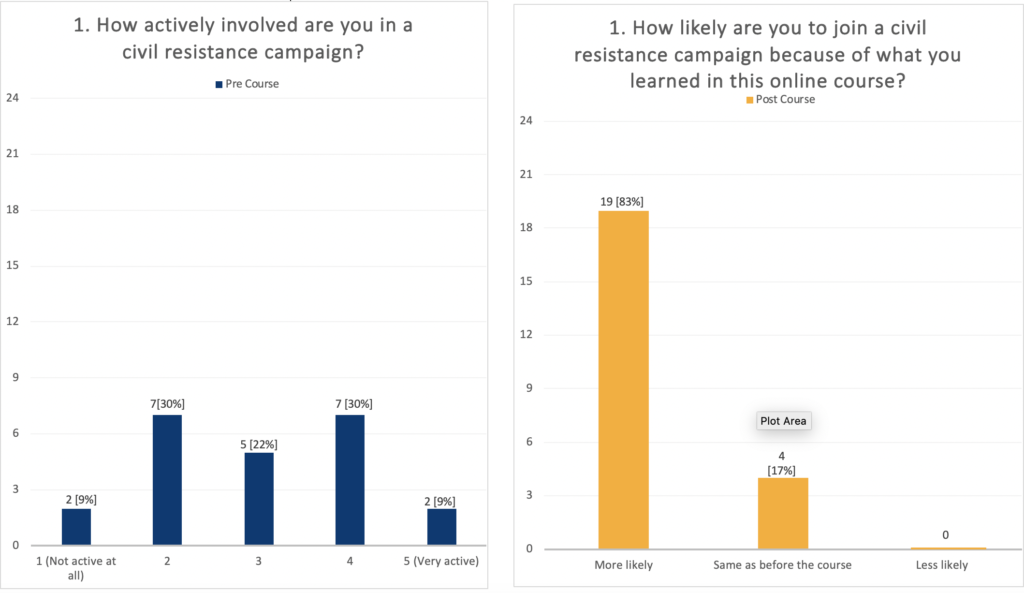
2. How actively involved are you in writing, researching, speaking or teaching about civil resistance?/After having completed the online course, how much more likely are you to engage in writing, researching, speaking, or teaching about civil resistance?
Pre course survey:
61% of respondents selected “2” or “3”, showing that they were not very involved in writing, researching, speaking or teaching about civil resistance.
Post course survey:
100% of respondents said they were more likely to write, research, speak or teach about civil resistance than before the course.
4. How skilled do you think you are in planning or implementing a civil resistance campaign?
Pre course survey:
19% of respondents selected “4” or “5” and 47% of respondents selected “1” or “2”, showing that they thought they weren’t very skilled in planning/implementing a civil resistance campaign.
Post course survey:
81% of respondents selected “4” or “5” and 5% of respondents selected “1” or “2”, showing that after taking the online course, they thought would be very skilled in planning/implementing a civil resistance campaign. None of the post course respondents selected “1” and only one respondent selected “2”
13. What are the three most important outcomes you hope to gain from this course/gained from this course? (Participants could choose multiple answers)
Pre course survey:
78% of respondents wanted to gain practical skills, 73% wanted more knowledge about civil resistance concepts and theories, and 65% wanted to expand their professional networks.
Post course survey:
78% said that they had more knowledge about civil resistance concepts and theories, and 60% said they had more knowledge about specific case studies and more practical skills.
15. On the scale below, select the number that best represents your current knowledge of civil resistance or nonviolent movements
Pre course survey:
9% of respondents selected “4” or “5” and 50% selected “1” or 2″, showing that they had limited knowledge about civil resistance or nonviolent movements.
Post course survey:
86% of respondents selected “4” or “5” and none of the respondents selected “1” or “2”, showing that, after the course, they knew substantially more about civil resistance or nonviolent movements.
24. On the scale below, select the number that best represents your view on how important you think strategic planning is in a successful civil resistance movement
Pre course survey:
91% of respondents selected “4” and “5”, showing that they thought strategic planning was very important for successful civil resistance movements.
Post course survey:
90% of respondents selected “5”, showing that even more respondents now strongly agreed that strategic planning was very important for successful civil resistance movements.
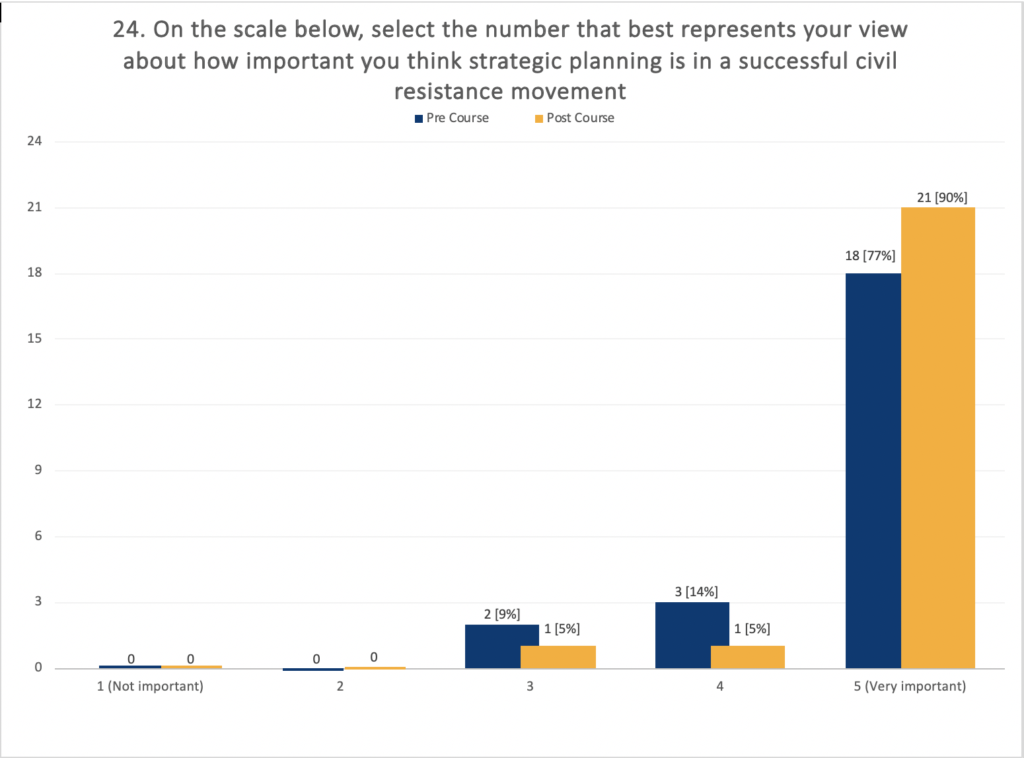
Final Evaluation Results
The participant-led course also included a final course evaluation, in order for participants to provide feedback on the course content, self-learning community, course platform, and more.
22 participants completed the final course evaluation. To see all of the graphs from the final evaluation, please click here. Click on the links below to see the selected graphs for each section.
I. Course Content
II. Group Work
III. General Impression of the Course
IV. Knowledge Gained
V. Course Moderators
VI. Applicability
VII. Self-Assessment
Selected Graphs
2. Course content was comprehensive and balanced, and topics were well selected
100% of respondents selected “4” or “5”, and no one selected “1”, “2”, or “3”, showing that all of the respondents either agreed or strongly agreed that the course was comprehensive and well balanced.
10. Please describe your overall experience with the group work. Were there any particular parts of the group exercise that you found especially helpful for engagement & learning or/and challenging and why?
- “The member of my group was engaged, motivated and available to work. It was a good experience.”
- “I personally gained a lot from the group exercises. However, there was only 1 other person in my group that was engaged – so was a shame it didn’t extend to the whole group (who had very fascinating backgrounds, so was looking forward to doing so). ”
- “I thought the assignment were well positioned in the course, and properly challenging us in order to get ahead to another level in the course. Time-wise, there was too much pressure to finish it and share it with the other learners; this could maybe be helped just by moving the deadline further into the week, also because basically nobody has enough time in weekdays to work on the assignments. There was goodwill of those who initially responded to the call for starting the assignments, but we didn’t get enough time to see each other’s’ results in time to reflect upon the work, give feedback, and also learn from each other. Or push each other to reach higher. I found the instructions very clear and well-designed otherwise.”
- “In both exercises there were only 2 of us completing the group exercise. This was enriching for me as I was able to learn a lot by doing the exercise, but did mean the two of us could only enrich the learning through our experience, whereas more individuals would have brought in more knowledge and experience that could have been applied to the group exercise.”
III. General Impression of the Course
12. I would recommend this course to other people
100% of respondents selected “4” or “5”, showing that they agreed or strongly agreed that they would recommend the course to other people. None of the respondents selected “1” or “2”.
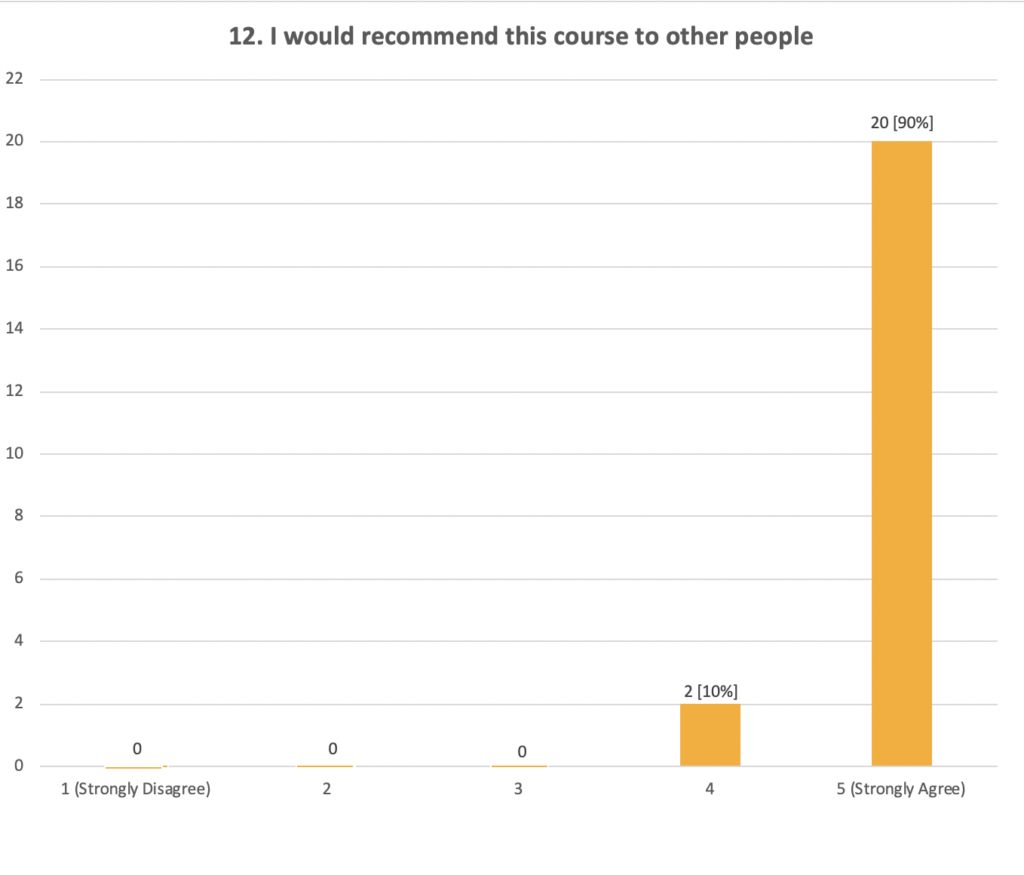
14. I learned a considerable amount of new information about civil resistance
95% of respondents selected “4” or “5”, showing that they strongly agreed that they had learned a considerable amount during the course. None of the respondents selected “1” or “2”
18. What did other course participants do that was helpful to your learning and engagement with the course content? What advice would you give other course participants?
- “Many of them widened the content of the course in the forums and explained personal experiences which were really valuable. Moreover, they also offered additional readings references which were also interesting.”
- “Moderators were thoughtful and supportive in their comments, often providing value-added knowledge to course modules.”
- “They often suggested reading materials that were relevant to the discussions, they enriched the discussion with their own experience, they helped push the conversation forward and reflected on the questions in a way that made it easier for everyone to engage.”
- “The moderators input really helped with kick starting discussions on the forums. It was insightful but also thought provoking. Lots of issues, resources, examples and thoughts were shared that didn’t come across in the readings and/or video. The detail provided was very valuable and will be content I go back to and read again in the future. The variety of expertise and input was fabulous as well.”
21. The knowledge I gained from the course will be relevant in my current and future study/work/activities
100% of respondents selected “4” or “5”, showing that all of them agreed or strongly agreed that the knowledge from the course would be relevant in their current and future educational or professional activities.
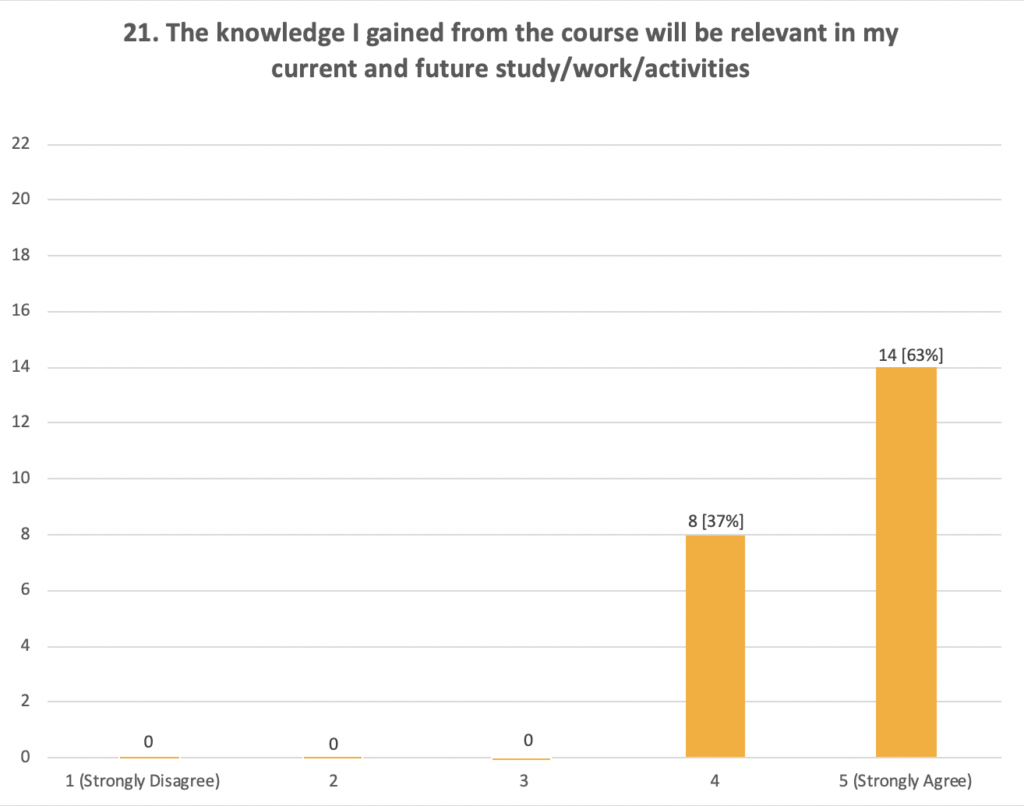
23b) If you kept up with the pace of work and your participation met your course commitment, what tips would you share with future participants about how you managed the course load, engagement with the material, and participation in the course forums?
- “Spread the readings throughout the week, post your comments as early as possible to give others a chance to engage with them, try to come up with one central idea for each forum and don’t shy away from asking questions and thinking out loud.”
- “Just post and not always feel you are required to know the topic in detail. Comment on other posts. Try to keep up every week and don’t run behind.”
- “I tended to spend 3.5 hours twice a week rather than 1 hour a day, as logging on, getting to that week’s content on the website etc. took a while (Perhaps I didn’t use the bookmark function effectively). Allocating this time was more manageable and realistic than 1 hour a day.”
Follow-Up Survey Results
Three months after the ICNC-Rutgers 2019 course ended, the participants in the course were asked to complete a follow-up survey. 15 participants responded. Included below are the graphed responses to selected questions from the follow-up survey. You can use the links below to navigate directly to each selected graph.
3. As a result of the course, how actively involved have you been in a civil resistance campaign over the last three months?
39% of respondents stated that they were very active in a civil resistance campaign as a result of the course.
4. As a result of the course, how actively involved have you been in teaching, developing curriculum or training about civil resistance in the last three months?
81% of respondents are more actively involved in teaching, developing curriculum, or training about civil resistance than they were before the course.
5. As a result of the course, how actively involved have you been in leading or planning a civil resistance campaign over the last 3 months?
68% of respondents are more actively involved in leading or planning a civil resistance campaign than they were before the course.
14. Please provide us with a brief description of a civil resistance action within the last three months that your campaign/movement considered to be successful. In what ways, if any, did the knowledge gained from the online course impact the action’s success?
- My organization and I, played a prominent role in an organised “Coalition of Civil Society Organizations For Protection of Civic Space”, led by Amnesty International Nigeria and Open Society Initiative for West Africa. In the last three months, we led a vigorous and successful campaigns against the brutalization of Sex Workers and Women – #AbujaPoliceRaidOnWomen, and also against an attempt by the Parliament to regulate the Social Media and further Shrink the Civic Space – #SayNoToSocialMediaBill.
- I have been involved in a civil resistance campaign called the Pashtun Tahafuz Movement in Pakistan. I have shared the knowledge and skills gained in the course with my fellow activists in Pakistan and the Pashtun diaspora here in the United States.
15. Please provide us with a brief description of an educational training/workshop within the last three months that your campaign/movement considered to be successful. In what ways, if any, did the knowledge gained from the online course impact the training/workshop’s success?
- Civil resistance training for future ministry leaders in seminary.
- The knowledge and skills acquired from this training has gone a long way in equipping to better take a course in my department where I teach. The title of the course is Case Studies in Peace and Conflict Studies- PCS 304. I have been able to take the course more effectively
- I participated in these workshops: by OSIWA centered on strengthening CSOs capacity and a Validation Meeting on Gender Reform of Nigerian Legal Frameworks by the National Democratic Institute. Knowledge gained during People Power Course proved invaluable to my contributions during these workshops. Among the core CSOs in Nigeria, I am seen as one of the few whose area of focus is a non-violent protest advocacy.
17. On the scale below, select the number that best represents your view about how important you think nonviolent discipline is in a successful nonviolent movement (1=Not at all, 5=Extremely important)
In the pre course survey, 63% of respondents believed that nonviolent discipline was extremely important in a successful nonviolent movement.
In the post course survey, that number had increased to 76% of respondents believing that nonviolent discipline was extremely important.
That percentage increased in the follow-up survey, as 86% of respondents selected that nonviolent discipline was extremely important.
Tips for Future Participants
- “Organizing the time, and presetting objectives, and knowledge to focus on, that would help to organize the time dedicated to the course, and to obtain the most important information possible in the context of the course.”
- “I would say, choosing certain hours for the ICNC course on a specific date was very helpful to organize my time. I spent an exact amount of time to learn new topic and then I was keeping track on the discussions the whole week. It helped me to keep up with everything and strengthen my knowledge.”
- “I felt during the first portion of the course I was able to deliver around an hour per day in the course. We had a child arrive a few weeks earlier than we expected so that through my routine off somewhat the past few weeks. I would still advise picking a consistent time every day to get on. Not simply when “you get some time”. It needs to be scheduled for the morning or on lunch time. In the evenings, you will begin to give yourself excuses not to work.
- “Spread the readings throughout the week, post your comments as early as possible to give others a chance to engage with them, try to come up with one central idea for each forum and don’t shy away from asking questions and thinking out loud.”
- “Just post and not always feel you are required to know the topic in detail. Comment on other posts. Try to keep up every week and don’t run behind.”
- “Use the app. It helps to step into the course at any desired moment, and also for offline viewing of many important video-materials”
Selected Testimonials
- “I am really impressed with the ICNC. And with fellow learners from such a wide geographical and professional scope, the course is reaching out on a global scale. This is also evidenced by materials that are available in numerous languages. It often felt that we were getting into new theoretical and practical “avenues” in a cooperative way; in People Power-style, so inspiring!”-Anonymous
- “This program is exceptionally brilliant. It opened my eyes to comparative and innovative approaches to nonviolent resistance. It provided hope. Seeing the amazing work activists are doing around the world provide a sense of global solidarity around defending rights and empowering citizens.”- Udo Jude Ilo
- “Taking this course has transformed my life. Aside that it opened my eyes to the praxis of nonviolence resistance, it gives me confidence that many of the tactics of nonviolent resistance can be used to achieve many feats, even at the interpersonal level of relationship with friends and colleagues”- Noah Opeyemi Balogun
- “It is a really motivating course whereby you get an in depth knowledge of the most important principles of civil resistance and it provides an array of valuable contents. You also get to know interesting CR experiences from the other participants. It becomes more relevant if you are somehow involved in CR. It has a positive side effect on your personal growth.”-Xavier Majó-Roca
- “The People Power course is hands down the most comprehensive online civil resistance course I have taken in over five years of self-research. The moderators and instructors had an excellent mixture of professionalism and passion. I could not recommend them more highly. I look forward to continuing to work with ICNC and Rutgers on this program. Absolutely solid course for students, practitioners, academics, and resisters around the world.” -Adam White
- “This course enriched my understanding of civil resistance. I am more aware now of numerous civil resistance campaigns around the world. The course has provided me with the skills, knowledge and key concepts in the literature. I have sufficient material to work with as an activist and researcher. If I need more information, the course has taught me who and where to turn to for help.” Aslam Kakar
